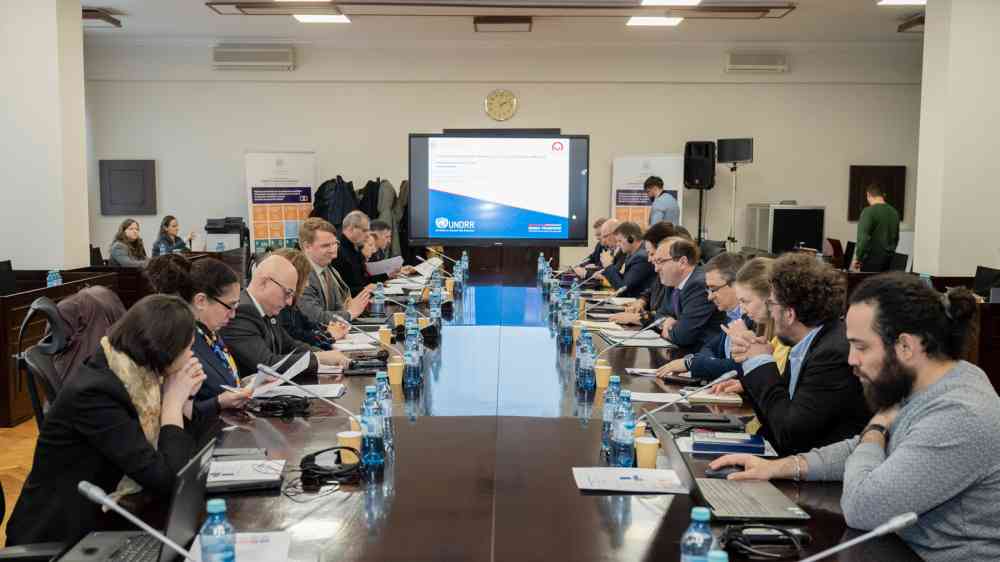The United Nations Office for Disaster Risk Reduction (UNDRR) and the Ministry of Infrastructure and Regional Development (MIRD) hosted a meeting to present the final findings of the project, gathering key stakeholders, including Secretaries of State from MIRD and other government ministries, the Polish Ambassador, the UN Resident Coordinator, UN agencies, development partners, and international financial institutions.
Launched in July 2024 with financial support from the Government of Poland, the project applied a global methodology developed by UNDRR and the Coalition for Disaster Resilient Infrastructure to assess the resilience of Moldova’s critical infrastructure, focusing on energy, ICT, transport, and water sectors. Moldova became the first country in Europe and Central Asia to adopt this approach, which has been implemented in Asia-Pacific, Africa, and Latin America.
Moldova is highly vulnerable to natural hazards such as floods, storms, and droughts, as well as broader impacts of climate change. These risks pose significant threats to critical infrastructure, which is vital for providing essential services and supporting key economic sectors.
The final meeting in Chisinau brought stakeholders together to advance the risk-informed recommendations from the project’s national roadmap report, aimed at strengthening Moldova’s resilience across sectors and governance levels.
The roadmap report examines vulnerabilities in critical infrastructure systems against disaster risks, highlighting systemic and cascading impacts, as well as interdependencies during disruptions. It identifies gaps and proposes improvements in policies, regulations, and their implementation, along with areas for enhanced coordination across sectors and governance levels. The report outlines cross-sectoral and sector-specific Resilience Action Plans, balancing short-term preparedness with long-term strategies, aligning with Moldova’s National Disaster Risk Reduction Strategy and the EU National Accession Programme.
Mr. Corneliu Cirimpei, the State Secretary of the Ministry of Infrastructure and Regional Development said that “effective disaster risk management in Moldova is currently focused more on response, rather than on proactive disaster risk reduction measures, and therefore there is a significant opportunity in updating and harmonizing the regulatory framework to strengthen preparedness and ensure the continuity of essential services in the face of disruptions.”
H.E. Tomasz Kobzdej, Ambassador Extraordinary and Plenipotentiary of the Republic of Poland, underlined the “importance of efforts to strengthen critical infrastructure resilience in the face of complex disaster risks and threats in Moldova”, emphasizing “the linkages of the project recommendations with Moldova’s EU accession process.”
Ms. Yesim Oruc, UN Resident Coordinator in the Republic of Moldova, welcomed “the findings of this comprehensive initiative as a steppingstone for developing both sectoral and cross-sectoral plans to strengthen infrastructure resilience in Moldova”, underlining “the resilience of critical infrastructure systems and the key services as a prerequisite for achieving the Sustainable Development Goals”
Ms. Natalia Alonso Cano, Chief of the UNDRR Regional Office for Europe and Central Asia, called for a “whole-of-government and multi-stakeholder approach to advance the priority actions identified in the roadmap report, ensuring continuity and coherence across partners in strengthening infrastructure resilience”, adding that “UNDRR remains committed to supporting Moldova in building its critical infrastructure resilience across sectors, in alignment with national priorities and global best practices.”
The project was supported by a Technical Working Group co-chaired by UNDRR and MIRD, comprising representatives from six ministries, the State Chancellery, the General Inspectorate for Emergency Situations, and the Agency for Geodesy, Cartography and Cadastre, along with UN agencies and civil society organizations. The initiative included consultations, webinars, and workshops, such as the Stress Test and Resilience Scorecard Workshop held in Chișinău in November 2024, with participation from the European Bank for Reconstruction and Development.
About the project
Launched in July 2024 with financial support from the Government of Poland, the “Strengthening critical infrastructure resilience in the Republic of Moldova” employs a global methodology developed by UNDRR and the Coalition for Disaster Resilient Infrastructure to assess the level of critical infrastructure resilience, identify gaps, foster collaboration among key stakeholders, and to formulate an implementation plan to enhance governance and investments in infrastructure resilience, in line with government priorities.
About UNDRR
UNDRR is the lead agency in the United Nations on disaster risk reduction. It provides leadership, expertise, and tools to enable countries to understand and act on disaster risks before they become disasters. UNDRR’s work is guided by the Sendai Framework for Disaster Risk Reduction 2015-2030, which aims to achieve a substantial reduction in disaster risk and losses by the year 2030.
